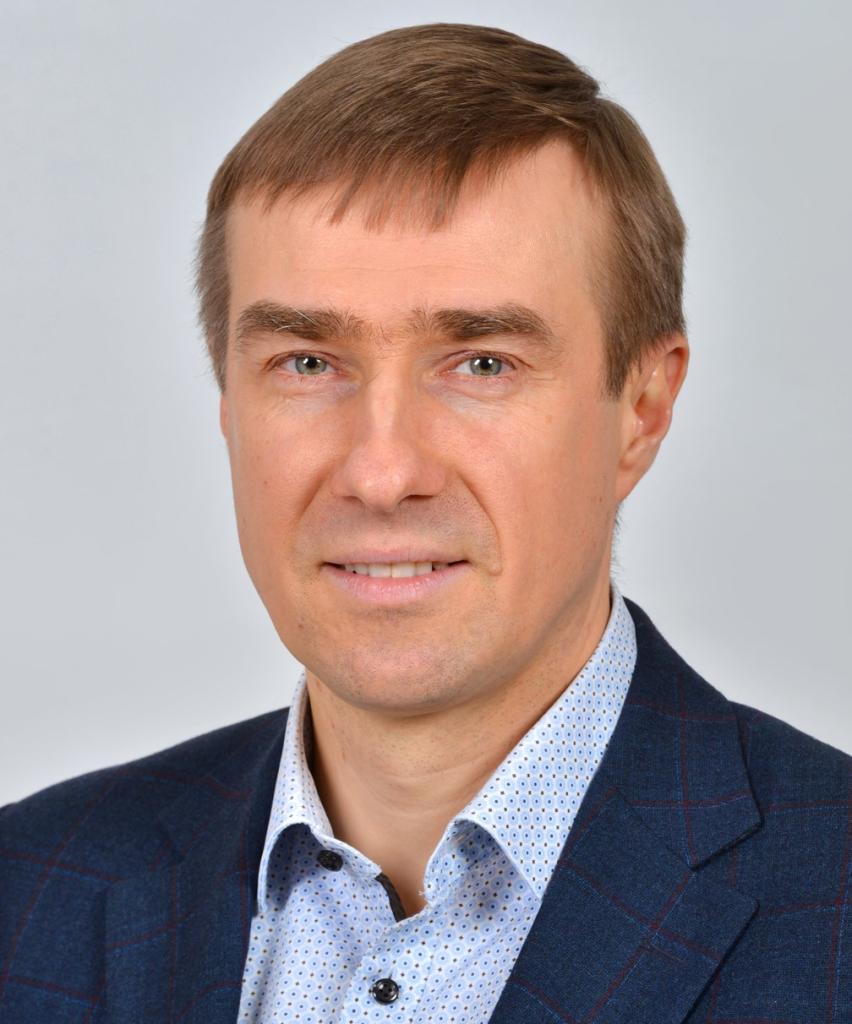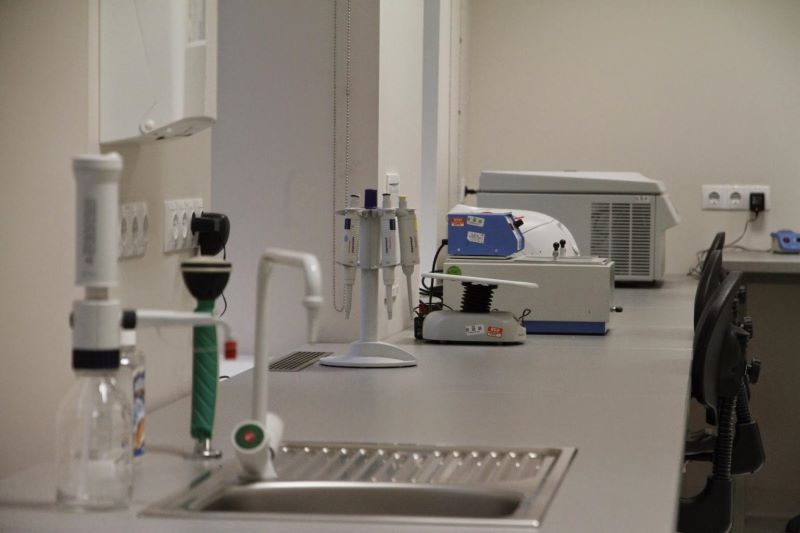Associate Professor Arvīds Irmejs: RSU has huge potential in cancer research
The Rīga Stradiņš University (RSU) Institute of Oncology and Molecular Genetics was established on 6 February 2024 by merging the Institute of Oncology and the Scientific Laboratory of Molecular Genetics.
The institute's history dates back to 2001 when the Institute of Hereditary Cancer was founded. Throughout these years, cancer research has remained its primary goal. We spoke with the institute's director, Assoc. Prof. Arvīds Irmejs (pictured), about the consolidation, the new institute's goals, current issues, and future plans.

Why was this merger necessary, and what changes has it brought?
One of the main research areas of the Institute of Oncology was hereditary cancer – breast cancer, prostate cancer, colorectal cancer, etc. Meanwhile, the Scientific Laboratory of Molecular Genetics focused on rare diseases. These fields overlapped since hereditary cancer belongs to the rare disease groups, making the consolidation logical. The merger was also necessary to optimise resources and strengthen research.
The consolidation certainly has many advantages.
We are now in the process of development and formation. RSU is planning to invest in various equipment, such as gene sequencing equipment, which will also be available to other RSU Science Centre institutes. Another benefit of the merger is the increased availability of human resources needed for molecular and genetic examinations. Our team consists of about 50 people – the institute includes the Laboratory of Tumour Clinical and Genetic Research led by Prof. Zanda Daneberga and the Scientific Laboratory of Molecular Genetics led by Linda Gailīte. The laboratories are located in separate buildings – Pauls Stradiņš Clinical University Hospital and RSU Dzirciema Street 16 – we are not shoulder to shoulder in our daily work but collaborate on various projects, such as the data set creation project.
Thanks to the consolidation, a project expert position has been created at the institute. This colleague will assist in project drafting, advising, and finding opportunities.
As a result of the consolidation, the so-called “cell research group” from the institute has de jure transferred to the Institute of Microbiology and Virology. The actual relocation however is planned for next year when all necessary premises are prepared. All the equipment required for cell research will thus be in one place, facilitating the work of researchers.
Structurally, it is relatively easy to implement changes “on paper,” but ongoing projects and collaborations remain, and new initiatives are being developed.
What are the current key projects and areas of activity?
We are currently working extensively on potential projects and searching for them. Besides research, we also engage in strategy and policy development, as well as advisory work.
One of the institute's goals is to position itself as an expert that can advise the Ministry of Health, the National Health Service, and other institutions on oncology-related issues.
For example, consulting on the development of state-funded molecular genetic tests for targeted therapy, which is treatment tailored to a specific patient.
The Institute has recently submitted five projects to the Fundamental and Applied Research Project competition. Two research projects funded by the Recovery and Resilience Facility are ongoing, one of them in collaboration with the Institute of Public Health. In the autumn, we are planning to submit a project to the OSCAR programme, which is dedicated to data circulation and storage activities.
We are also working on a project funded by private donations on the genetic population screening of hereditary breast and ovarian cancer. This initiative involves 450 women who have donated their genetic material for research to detect increased breast cancer risk.

Several of our projects have received support from the consolidation plan's research and academic career grant competition. One of the supported projects plans to conduct genetic testing for breast and ovarian cancer on 1,000 genetic samples from our data bank to understand the mutation spectrum in Latvia and its link to family cancer history.
In collaboration with the Institute of Public Health, we are conducting a project that studies patient survival and its quality, as it is increasingly important today for cancer patients to have as fulfilling and pain-free life as possible. The National Health Service plans to introduce such treatment evaluation in the coming years, and this is a pilot project on how patients evaluate their treatment and how they feel afterwards.
As part of the National Research Programme, a study on bladder cancer is underway in collaboration with Rīga East University Hospital and Rīga Technical University. It aims to detect markers in urine for the early diagnosis of bladder cancer.
We also participate in rare disease research, such as the neurological rare disease project led by Assoc. Prof. Viktorija Ķēniņa, which focuses on biomarker identification.
We are also hiring tenured professors and interviewing potential candidates. There are vacancies in both adult and paediatric oncology. Potential candidates have already visited RSU, and we hope for positive responses.
What are the institute's future plans?
From 25 to 30 June, RSU hosted meetings of three Breast and Ovarian Cancer consortia, bringing together experts from Europe, America, Asia, Australia, Africa – from all continents where cancer research is conducted. These face-to-face meetings are organised by different consortium members each time, and this year it was our turn. This was an important event for networking and establishing new collaborations. Participation in consortia allows us to engage in significant international research. We have to send a certain number of breast cancer and other hereditary cancer tissue samples to the shared database. For example, we have provided 500 clinically well-described breast cancer samples, making us co-authors of the resulting high-quality publications.
Another direction that we plan to develop is initiating studies as consortium members and requesting consortium data for our research.
The consortium database contains about 70,000 hereditary breast cancer samples, which is a huge number compared to the 800 we have in Latvia. If our researchers have an idea, they can test and implement it based on this large dataset.
We are now actively working on a Horizon project on genetic testing of hereditary cancer. The main focus of the project is to make oncogenetic testing accessible in Europe. If today a person develops hereditary cancer without knowing their risk beforehand, it can be considered a failure of healthcare. Because genetic tests are available, affordable, and accessible to identify high-risk individuals.
We have adopted this idea as our institute's motto – we must do everything to make genetic technologies and opportunities for identifying hereditary cancer risks available to society as soon as possible.
How does the institute position itself on the Latvian and international cancer research map?
Of course, we are not the only cancer research institution in Latvia, and there are several units within the RSU science ecosystem working on this issue. The number of cancer cases is increasing, cancer patients are living longer, and there is growing demand for repeated treatment and improved quality of life. This means that
the demand for expertise in oncology is growing exponentially.
It is important for RSU to recognise its enormous resources and potential in cancer research – we have the Institute of Microbiology and Virology, which researches melanoma. The 'cell research group' also devotes part of its activities to oncology. The Institute of Public Health has a long-standing collaboration with Norway on cervical cancer screening; the RSU Institute of Occupational Safety and Environmental Health works on biomonitoring issues, studying the impact of harmful substances and environmental factors on cancer occurrence. Our institute also plans to work in this direction – together with Pomeranian University, we will study harmful microelements influencing cancer development. These and other previously mentioned current and potential projects highlight the international dimension of the Institute of Oncology and Molecular Genetics, as research is unimaginable without it.
The RSU Social Sciences Research Centre has an interdisciplinary approach to oncology. For example, the Vice-Dean of the Faculty of Social Sciences, Mārtiņš Daugulis, leads Oncology think tanks, and the first such think tank was held at the RSU Anatomy Museum on 2 May.
Research is also being conducted in RSU departments – in the Department of Surgery on colorectal and thyroid cancer, as well as in the Department of Obstetrics and Gynaecology and other departments. It is important to recognise RSU’s potential in cancer research and virtually consolidate it.
It has been over 100 days since you became the institute's director – how do you feel, and what are your thoughts on this period?
The institute’s team has great potential, and it is a pleasure to work as we feel the administration’s responsiveness and understanding. Each researcher can realise their level of expertise using all our resources. There is a lot to be done, but by gradually achieving the goals and tasks, RSU can become a major player in cancer research and expertise.
Related news
 The most significant scientific event of the year, RSU Research Week, has concludedResearch, Traditional Events
The most significant scientific event of the year, RSU Research Week, has concludedResearch, Traditional Events


